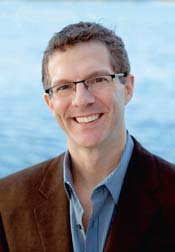 |
 |
| current issue |  | past issues |  | send a letter/news |  | address update |  | advertise |  | about us |  | alumni home |
Features
|
The First UROP Grant Recipients
Where are they now? |
Return to The First UROP Grant Recipients |
Jesse Dallery '90
Major: psychology
Job title: Associate professor, psychology, University of Florida
Hometown: Gainesville, Fla.
 Jesse Dallery '90 |
What have you been doing since graduation, and what are you doing now?
After graduation I stayed in Dover for two years. I needed a break from school, and, I wanted to explore my priorities and passions. And, I loved being in NH - the beaches, mountains, bike riding, skiing. It was so nice to have some space to do some thinking, and to do it in a beautiful place. I worked as a Psychiatric Counselor at the Portsmouth Pavilion, which was a terrific experience. I also continued to train in Shotokan Karate—I started as an undergraduate. After many long bike rides and hikes in the White Mountains, I discovered that I was passionate about combining a science of behavior with a desire to improve human welfare. So, I applied to PhD programs in clinical psychology. Someone must have made an error on the admissions committee, because I was admitted to the program in Clinical Psychology at Emory University in 1992.
I spent six years in graduate school. My scientific work was very similar to the work I did at UNH. It involved laboratory animals, and quantitative modeling of behavior. I was struck (and still am!) by how an animal's decision making could be described by mathematical equations. I completed a predoctoral clinical internship in Baltimore at the University of Maryland, and then completed a postdoctoral fellowship in Behavioral Pharmacology at Johns Hopkins.
Since 2000, I've been teaching Psychology at the University of Florida in Gainesville. I teach, do research, and here and there I've done some clinical work (if you're curious, here's my website: www.psych.ufl.edu/~dallery). I'm now an Associate Professor. It's funny to think about, because so much of what I started at UNH has brought me to this place in my life. And in particular, the research I did in the Psychology Department at UNH played a big role in my life's journey. Getting into graduate school was mostly due a fit between my scientific interests and my advisor's interests at Emory. Getting my first job was also a matter of fit in academic interests. I'm also still doing Karate, and since I'm in Florida I had to pick up golf.
The support I got through UROP, and through my advisors in Psychology at UNH, played a tremendous role in my life. It might seem like an exaggeration, but I doubt that I'd be where I am today without this support. I'd probably still be hiking around NH.
Your UROP project was entitled "Multi-Level Analysis of Behavior in a Resetting Ratio Schedule." Can you tell us what you did, and what you got out of it?
That has to be the most boring UROP title! I guess I liked it because it sounded scientific. I tried to see if we could use an animal lab model to learn about ecologically important behavior in the wild. And, the study suggested that yes, we could. I think the main thing I learned was to be independent—in terms of my thinking and problem solving. I learned that science takes self-initiative. There's little structure; it's not like being in a class. For some reason, I had enough curiosity to go to the library (nothing was online back then) and do some reading, which bred more curiosity.
Did your research have an impact on what you did later?
Yes, my research at UNH had a very direct impact on what I did next, and on what I'm doing now. I continued to do work with laboratory animals in graduate school. I focused on choice and decision making in graduate school, and later I integrated this interest with analysis of how drugs of abuse affect decision making. And, I'm still doing this research here in Florida.
What do you remember about being on the cover of the Alumnus (assuming you remember it)?
I remember that I didn't have any props—I had prop envy. I just had a book and some notebooks, and others had diving gear, movie reels, drills.
Anything else you'd like to add? Any advice for current students?
I still feel like a seeker of advice rather than a giver, but it helped to remember: "you get out what you put in."
< Previous recipient Next recipient >
Back to the '88 UROP stories
blog comments powered by Disqus

